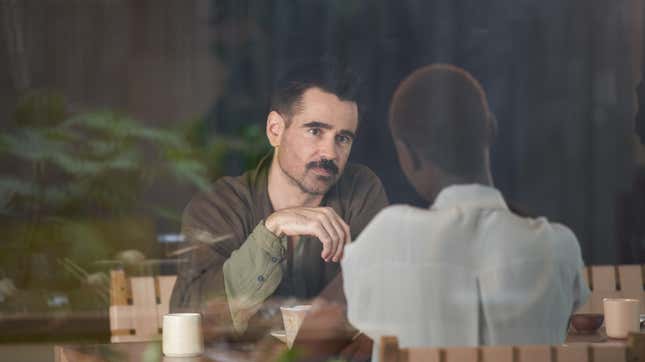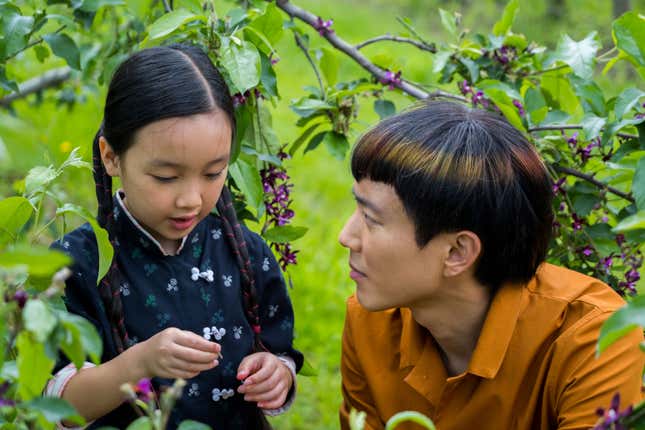
In perhaps the most viscerally upsetting scene of Steven Spielberg’s A.I., a human mother confirms that David, the robot boy programmed to love her, truly has been a temporary substitute for her real son. Concerned that he’ll pose a danger to her recently revived biological child but unable to bring herself to send him back to his makers for destruction, the mother takes David out to a forest to abandon him instead. “I’m sorry I didn’t tell you about the world,” she says before she drives off, and Spielberg shows his image growing blurrier and less distinct in his former parents’ rearview mirror.
Nothing in Kogonada’s new movie, After Yang, is so operatically devastating. The film’s register is more contemplative, its characters’ decisions less immediately and obviously fraught. When a malfunction causes “techno-sapien” robot Yang (Justin H. Min) to indefinitely power down, his surrogate family misses him; no gleam that could ever be mistaken for mania has seemingly ever appeared in his eyes. But After Yang, adapted from a short story by Alexander Weinstein, is one of the few science fiction films since A.I. to explore the unnervingly seamless transition between uncertainties about artificial intelligence and anxiety about the nature of our own humanity. Also like the Spielberg film, it further complicates the issue by bringing in the practical impossibilities of parenthood.
Technically, Yang is nobody’s parent and nobody’s son. Yet he has moments that echo both roles. Years earlier, he was brought into his new family by Jake (Colin Farrell)—refurbished, certified, Jake keeps adding, a little defensive about whatever discount he received—to serve as a babysitter and cultural conduit for Mika (Malea Emma Tjandrawidjaja), their adopted Chinese daughter. This is common practice in the movie’s version of the future, giving Mika a connection to the culture that birthed but isn’t raising her—even if that connection comes through Yang’s Wikipedia-like barrage of fun facts, rather than a “real” human.
Mika thinks of Yang as her dedicated older brother, but he clearly has some parenting responsibilities, however menial, while Jake and Kyra (Jodie Turner-Smith) attend to their careers. At the same time, Yang comes across as a son to Jake and Kyra, or at very least a beloved nephew—a fixture in their game nights and their family photos, like the one that the group poses for at the beginning of the film. Kogonada returns to that scene later on, as Jake sorts through a cache of Yang’s memories, some as brief (and easy to loop) as the shortest TikToks.
It’s not always clear whether Jake examines these snippets out of grief or hope. What is obvious is that when Yang shuts down unexpectedly, the family would prefer to revive him, so Jake—whose position as the owner of an under-patronized tea shop is less urgent than his wife’s job—runs point on this responsibility. Kyra appears a little more ambivalent about how much time the endeavor should take up, while Mika feels Yang’s absence most acutely. As Jake visits with various tech experts, After Yang becomes a series of small, nested mysteries: whether Yang can be revived; the identity of the mystery woman (Haley Lu Richardson) who pops up in his memories; and how exploring the question of Yang’s sentience will determine how the family processes his potential loss.
Anyone who has seen Kogonada’s previous film, the lovely Linklater-as-aesthete drama Columbus, will recognize that he’s not interested in ratcheting up traditional tensions, preferring instead to create a sustained mood for his characters to work their way through. Yet After Yang has more variety than Columbus, which—enchanting as it was—sometimes felt a little too orderly and buttoned-up for its own good, betraying its maker’s origins as a visual essayist with an abiding appreciation of things in their correct, cleanly architectural place. Kogonada still favors careful framing-within-framing and a certain fixed visual austerity, but he also appears willing to occasionally drop his version of a confetti bomb, like an expressive, grin-inducing opening credits sequence that functions as both a visual delight and a sly flash of exposition. Somehow, Yang’s robotic nature appears to loosen the filmmaker up.

Further opportunities to relax that exacting control are provided by Yang’s memory fragments, which—as Jake sees more of them—seem to blend with the family’s memories of Yang, overlapping and echoing, repeating certain lines and gestures from slightly different angles. If these are indeed mixed-and-matched feeds of organic and digital recollections, there aren’t notable discrepancies or inconsistencies to pore over. Instead, Kogonada evokes the feeling of turning a moment over in your head, mentally reciting it like lines from a song. Every member of the small cast takes to this approach, and Farrell is particularly affecting without appearing to do much acting at all.
After Yang is ruminative enough that attempting to further describe it risks spoilage—not of definitive revelations or plot twists (there are relatively few of those) but of the film’s delicate spell. Has a former critic made a cannily critic-proof movie, where any attempts at analysis or even description will feel like stealing the movie’s low rumbles of thunder? If he has, it’s through the quietly ambitious gumption of a work that captures, among other things, the annoyances of dividing childcare between two working parents; the conflicting desires to protect your child from grief and allow them to learn from it; and how unknowable feelings can develop in unexpected corners of the human experience. Despite the sci-fi trimmings—or, really, in perfect sync with them—the anxiety After Yang generates has the gentle, humming pervasiveness of real life. It’s trying its best to tell us about the world.